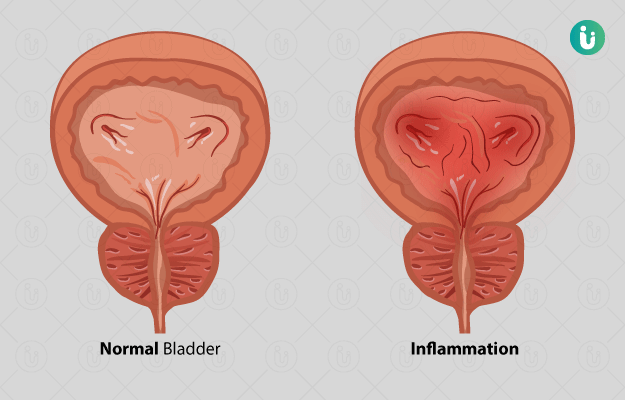What is cystitis?
Cystitis is a common infection that leads to inflammation of the urinary bladder. It is an infection of the lower urinary tract and is more commonly seen in women as compared to men. It is the leading cause of hospitalisation, affecting people in the age group of 25 years and above. There are more than 20 million people having cystitis worldwide.
What are its main signs and symptoms?
Common signs and symptoms may include:
- Persistent and strong desire to pass urine (Read more: Frequent urination causes)
- Burning sensation in the urethra while passing urine
- Cloudy and strong smelly urine
- Discomfort in the pelvic region
- Mild fever
- Blood in the urine
What are its main causes?
It is most often caused due to a bacterial infection. Left untreated, this infection can travel upwards and affect the kidneys leading to pyelonephritis. Females can get infected more frequently than men due to the short size of their urethra.
Other causes include:
- Defect in the bladder mechanisms.
- Any foreign material that irritates the bladder.
- Nerve dysfunction of the bladder.
- Immune system disorder may lead to cystitis.
- Bladder stone
Rarely, it may result due to drugs, radiation therapy or specific irritants like hygiene sprays for females or by the use of spermicides. Catheter-associated urinary tract infections are also common.
How is it diagnosed and treated?
Initially, symptoms, their duration, and impact on daily routine may be assessed to rule out other possible conditions. The diagnosis may include:
- Physical and neurological tests
- Pain assessment and urine voiding tests
- Urine analysis
- Urine culture
- Cystoscopy – using a camera-fitted tube to look inside the urinary bladder
- Imaging studies like ultrasonography and X-ray of the pelvis
Treatment for cystitis includes use of antibiotics to eradicate the organism. For a mild infection, antibiotic course may not go beyond 3 days for females and 7-14 days for males. It is mandatory that the full antibiotic course is taken, even if symptoms start getting better. Over-the-counter medicines and certain acidic products like ascorbic acid may be effective due to acidic nature that kills the infectious agents.
Lifestyle modifications include:
- Have plenty of water
- Maintain thorough personal hygiene of the intimate area to prevent infections
- Make a list of foods that cause discomfort and avoid them.
- Avoid certain foods like spicy food, chocolate and caffeine.
- Increase bladder capacity by trying to hold the urine while urinating.
- After urinating, especially females should wipe from front to back to avoid the spread of infection from anus to urethra.
- Use of showers instead of bathtub can reduce infection.
Cystitis may become uncomfortable if left unattended but usually, it can be treated easily and effectively with appropriate treatment.

 Doctors for Cystitis
Doctors for Cystitis  OTC Medicines for Cystitis
OTC Medicines for Cystitis



















